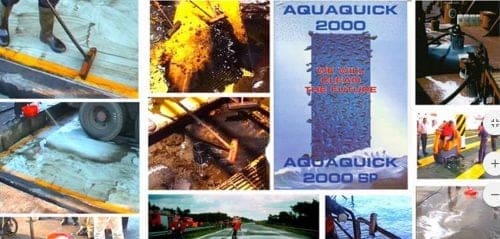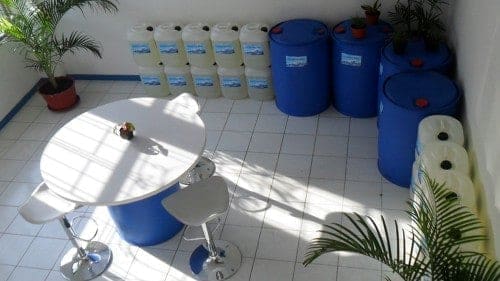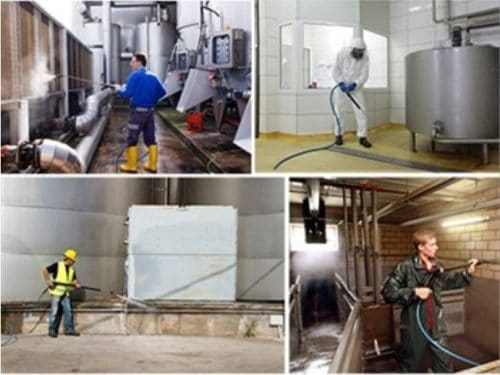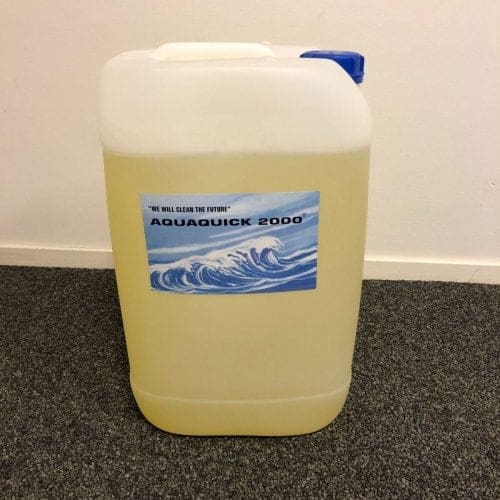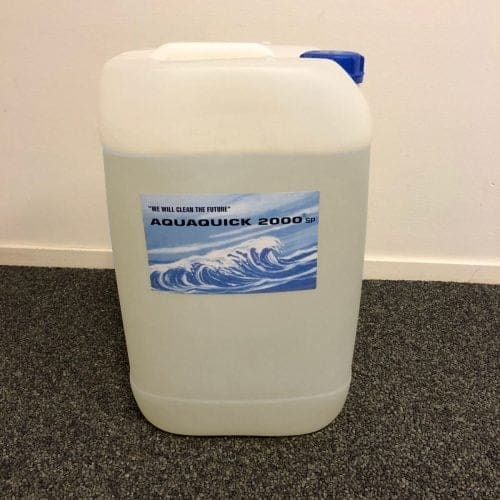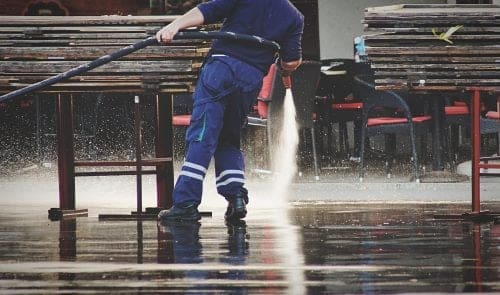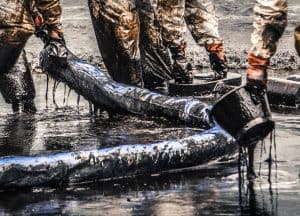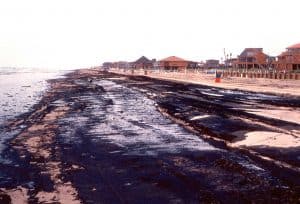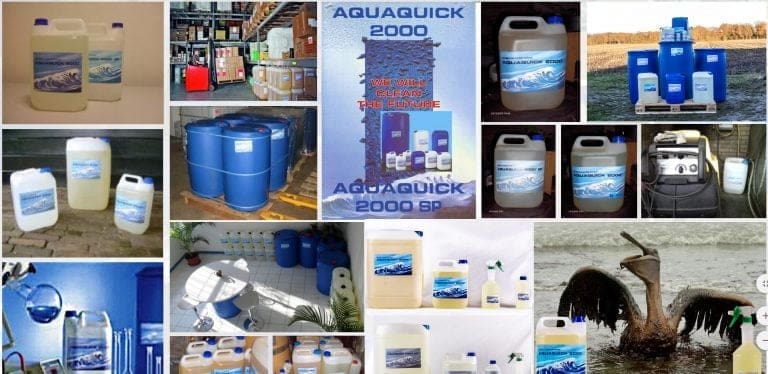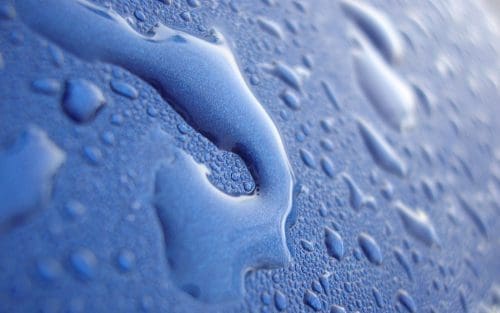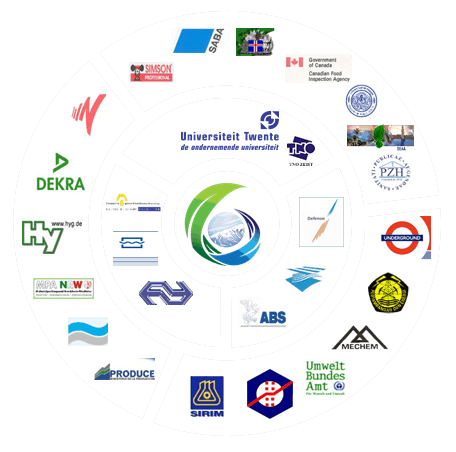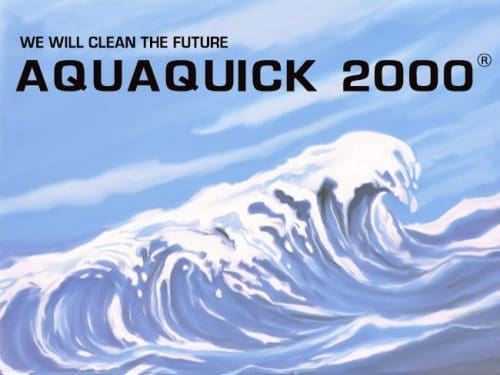Oil spills remain a persistent environmental threat, causing extensive harm to marine life, ecosystems, and communities. The urgency to find effective and eco-friendly solutions to tackle these disasters has never been greater. In this comprehensive guide, we’ll delve into the challenges posed by oil spills, explore traditional cleanup methods, and spotlight the revolutionary product, AQUAQUICK 2000. This guide not only provides insights into the devastating impact of oil spills but also emphasizes the role of AQUAQUICK 2000 in answering the crucial question: “How to clean up oil spills?”
Understanding the Dynamics of Oil Spills:
Understanding the dynamics of oil spills is crucial for effective environmental management and remediation. When petroleum hydrocarbons are released into the environment, whether due to tanker accidents, pipeline leaks, or industrial mishaps, a complex set of processes unfolds. The spilled oil can undergo physical weathering, breaking into smaller droplets through dispersion, emulsification, and evaporation. These processes influence the oil’s behavior on water surfaces, affecting its trajectory and interactions with marine life.
Moreover, the chemical composition of the spilled oil determines its impact on ecosystems. Lighter oils may evaporate more rapidly, posing different challenges than heavier oils that may persist longer in the environment. Understanding these dynamics helps shape appropriate response strategies, including the selection of cleanup methods and the deployment of innovative solutions like AQUAQUICK 2000. By comprehending the intricate processes at play, we can better protect marine habitats, wildlife, and the communities reliant on healthy ecosystems, ultimately contributing to more effective oil spill mitigation efforts.
The Devastating Impact of Oil Spills:
Oil spills stand as ecological catastrophes, inflicting widespread and enduring damage across marine environments, wildlife, and human communities. The consequences of these disasters extend far beyond the immediate aftermath, leaving a trail of destruction that lasts for years. Here’s a closer look at the profound impact of oil spills:
- Marine Habitat Degradation: Oil spills result in the degradation of marine habitats, disrupting the delicate balance of ecosystems. The toxic nature of spilled oil penetrates the water, affecting the underwater flora and fauna and jeopardizing their survival.
- Risks to Wildlife: The impact on wildlife is severe, with marine species facing acute threats. Oil-coated birds, fish, and marine mammals suffer from reduced insulation, hindering their ability to regulate body temperature. This often leads to fatalities and a significant decline in biodiversity.
- Disruption of Human Livelihoods: Communities dependent on marine resources, such as fishing and tourism, bear the brunt of oil spills. The contamination of water bodies and coastal areas directly impacts local economies, causing financial losses and jeopardizing the well-being of those reliant on these industries.
- Toxicity and Long-term Ecological Imbalances: The toxicity of oil in water introduces harmful substances into the environment, leading to long-term ecological imbalances. The presence of these pollutants disrupts the natural processes that sustain marine ecosystems, creating a ripple effect across the food chain.
- Challenges in Cleanup: The aftermath of an oil spill necessitates a prolonged and resource-intensive cleanup process. Traditional cleanup methods, including skimming, burning, and the use of dispersants, come with limitations and potential harm to the environment.
- Impact on Human Health: Beyond the environmental consequences, oil spills pose risks to human health. Exposure to oil and its components can lead to various health issues, affecting both those directly involved in cleanup operations and local communities.
How to Clean Up Oil Spills Efficiently and Sustainably
In the quest to comprehend how to clean up oil spills, the severity of these disasters has intensified the demand for effective and environmentally friendly solutions. While traditional cleanup methods have addressed immediate concerns, they often prove insufficient in specific conditions. This intensifies the search for innovative and sustainable approaches to mitigate the impact of oil spills on our oceans and waterways.
The urgency to understand how to clean up oil spills has led to a paradigm shift in the approach, pushing for solutions that not only address the immediate aftermath but also contribute to long-term environmental preservation. This relentless pursuit of better, eco-conscious strategies reflects the commitment to finding comprehensive answers to the pressing question of how to clean up oil spills in the most efficient and sustainable manner.
Introducing AQUAQUICK 2000: A Sustainable Solution:
AQUAQUICK 2000 emerges as a revolutionary and environmentally conscious product in the fight against oil spills. This water-based cleaning solution, crafted from ecological materials and plant extracts, is designed to target a spectrum of hydrocarbons effectively. What sets AQUAQUICK 2000 apart is its unique composition that ensures not only the efficient cleanup of spills but also a minimal environmental footprint.
Eco-Friendly and Safe:
AQUAQUICK 2000’s composition is non-toxic to aquatic organisms, ensuring the safety of marine life. Importantly, it does not harm metals, plastics, paints, or rubbers, offering a solution that is both effective and environmentally responsible. Its biodegradable nature means it breaks down into harmless substances, reducing the ecological impact associated with cleanup efforts.
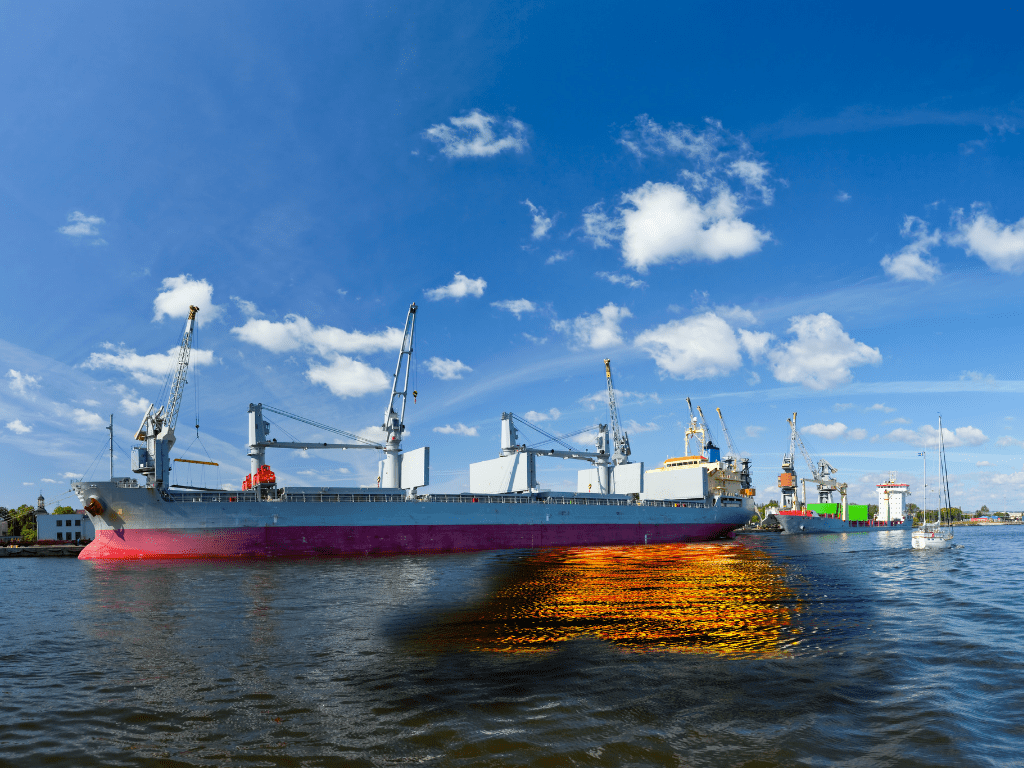
How AQUAQUICK 2000 Works:
AQUAQUICK 2000 employs a revolutionary approach to oil spill cleanup, utilizing a blend of ecological materials and plant extracts to facilitate efficient remediation. The product’s mechanism involves several key steps, making it a highly effective and environmentally conscious solution:
- Bioremediation Process: AQUAQUICK 2000 harnesses the power of bioremediation, a natural process where bacteria and microorganisms break down hydrocarbons. This process stimulates the growth of these beneficial microorganisms, which act as nature’s own cleanup crew.
- Stimulation of Microbial Activity: AQUAQUICK 2000 contains special nutrients that serve as a catalyst for the explosive growth of bacteria and microorganisms naturally present in the environment. These microorganisms play a crucial role in breaking down hydrocarbons effectively.
- Transformation of Hydrocarbons: The bacteria, in the presence of AQUAQUICK 2000, metabolize the hydrocarbons found in oil spills. This metabolic process results in the conversion of hydrocarbons into harmless byproducts such as carbon dioxide, water, biomass, and energy.
- Aerobic Biodegradation: The biodegradation process facilitated by AQUAQUICK 2000 is aerobic, meaning it involves the consumption of oxygen. This natural aerobic breakdown is essential for minimizing the environmental impact of oil spills.
- Neutralization of Pollutants: As the microorganisms consume the hydrocarbons, the pollutants are effectively neutralized. This process not only cleans up the immediate spill but also contributes to the restoration of the affected ecosystem.
- Support for Natural Ecosystem Recovery: AQUAQUICK 2000’s bioremediation approach goes beyond cleanup; it actively supports the natural recovery of ecosystems by promoting the growth of beneficial microorganisms and minimizing the long-term ecological impact of oil spills.
Application of AQUAQUICK 2000:
Applying AQUAQUICK 2000 is a straightforward process, making it a practical choice for various spill scenarios. The product needs to be diluted with water, allowing for adaptability to different spill sizes and types. Whether dealing with small-scale leaks or large maritime incidents, AQUAQUICK 2000’s flexibility makes it a versatile solution in the fight against oil spills.
A Proven Track Record:
Since its launch, AQUAQUICK 2000 has demonstrated success in numerous oil spill scenarios. Its effectiveness spans diverse environments, from oceans and rivers to industrial sites. The product’s reliability in environmental cleanup operations positions it as a go-to solution for addressing the challenges posed by oil spills.
Environmental Friendly Oil Spill Dispersant:
AQUAQUICK 2000 stands as more than a mere oil spill cleanup solution; it serves as an environmentally friendly oil spill dispersant, elevating its role in addressing environmental pollution. This remarkable product not only efficiently cleans up oil spills but also excels in dispersing them, augmenting its overall efficacy. Its unique capabilities make it a comprehensive tool in the ongoing battle against environmental degradation caused by oil spills.
Furthermore, AQUAQUICK 2000’s versatility extends beyond oil spill scenarios, finding application in general cleaning tasks across various industries. Additionally, its effectiveness in fuel-based fire extinguishing showcases the product’s diverse and impactful contributions to environmental protection and safety. As we explore the multifaceted benefits of AQUAQUICK 2000, it becomes evident that its role transcends traditional cleanup methods, marking a significant stride towards more sustainable and effective solutions for environmental challenges.
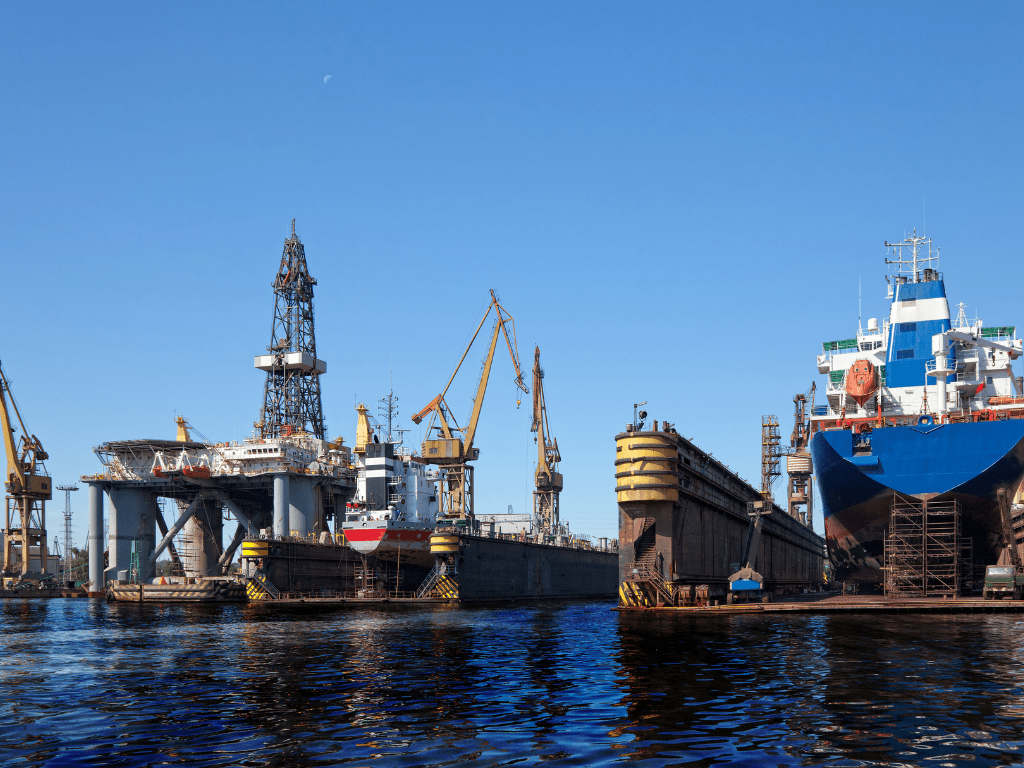
AQUAQUICK 2000 Benefits:
AQUAQUICK 2000 offers a myriad of benefits, making it a game-changer in environmental cleanup. This revolutionary solution excels in versatility, safety, and sustainability, ensuring a positive impact on both ecosystems and industries.
1. Multi-Functional Degreaser:
AQUAQUICK 2000 serves as a versatile degreaser, effectively breaking down and removing various hydrocarbon compounds. Its multi-functional nature makes it adaptable for use in diverse industrial settings, from oil refineries and metal industries to garages and workshops.
2. Suitable for All Hydrocarbon Combinations:
The product’s efficacy extends across different types of hydrocarbons, including animal, vegetable, synthetic, and mineral oils and greases. This versatility ensures that AQUAQUICK 2000 can address a wide range of spills and contamination scenarios.
3. No Damage to Metals, Plastics, Coatings, Rubbers, etc.:
A crucial advantage of AQUAQUICK 2000 is its gentle yet effective cleaning action. It does not cause harm to various materials such as metals, plastics, coatings, and rubbers. This property makes it a safe choice for cleanup operations without compromising the integrity of the surfaces being treated.
4. 100% Biodegradable (Remains: CO2 and H2O):
Environmental sustainability is a hallmark of AQUAQUICK 2000. The product is entirely biodegradable, breaking down into harmless substances such as carbon dioxide (CO2) and water (H2O). This ensures that the cleanup process itself has minimal impact on the environment.
5. User-Friendly, Energy & Cost-Saving, and Non-Flammable:
AQUAQUICK 2000 is designed with user convenience in mind. It is user-friendly, meaning that its application and handling require no specialized training. Additionally, the product contributes to energy and cost savings, offering an efficient solution without unnecessary resource expenditures. Furthermore, its non-flammable nature adds an extra layer of safety during handling and application.
6. No Special Safety Precautions Required:
Unlike some traditional cleaning agents, AQUAQUICK 2000 does not necessitate the implementation of special safety precautions during use. This simplifies the application process, making it accessible for a broader range of users without compromising safety standards.
7. Reduction of Chemical Waste:
AQUAQUICK 2000 contributes to the reduction of chemical waste associated with cleanup operations. Its biodegradability ensures that the byproducts resulting from the breakdown of hydrocarbons are environmentally friendly, reducing the overall chemical footprint of the cleanup process.
8. Accelerated Biodegradation of Pollution (AQUAQUICK 2000 Only):
A unique feature of AQUAQUICK 2000 is its ability to accelerate the biodegradation of pollution. By stimulating the growth of bacteria and microorganisms that feed on hydrocarbons, the product actively promotes the natural breakdown of pollutants, contributing to a faster and more sustainable recovery of affected ecosystems.
AQUAQUICK 2000 SP – An Environment and User-Friendly Variant:
AQUAQUICK 2000 SP, a variant of AQUAQUICK 2000, is tailored for situations where wastewater is drained into the sewage system or the environment while using a grease/oil separator. This fast-splitting surfactant/degreaser complies with German regulations for fast-splitting cleansers, providing an additional environmentally conscious option for cleanup practices.
AQUAQUICK 2000 in Action – SApCom Division:
The SApCom division of AQUAQUICK 2000 specializes in providing environmentally safe alternative treatment and cleaning solutions. By focusing on supplying and applying cleaning products correctly, SApCom ensures compliance with standards and requirements from clients and local environmental authorities. The division’s advantages include environment-safe applications, recycling benefits, and improved productivity and profitability.
Conclusion: A Step Towards a Cleaner Future:
In the ongoing battle against oil spills, AQUAQUICK 2000 stands out as a significant advancement in environmental protection technology. Its ability to efficiently tackle oil spills while preserving ecological balance makes it an indispensable tool in safeguarding our planet’s water resources. As the world continues to face environmental challenges, innovative solutions like AQUAQUICK 2000 offer hope for a cleaner and more sustainable future.
In summary, AQUAQUICK 2000 provides a comprehensive answer to the question of how to clean up oil spills effectively. With its versatility, effectiveness, and environmentally friendly nature, it is a key player in efforts to address and mitigate the impact of oil spills worldwide. By adopting solutions like AQUAQUICK 2000, we take a step closer to ensuring a cleaner and healthier environment for generations to come.

